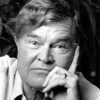Paul Fussell

Paul Fussell
Paul Fussell, Jr.was an American cultural and literary historian, author and university professor. His writings cover a variety of topics, from scholarly works on eighteenth-century English literature to commentary on America's class system. Fussell served in the 103rd Infantry Division during World War II and was wounded in fighting in France. Returning to the US, Fussell wrote extensively and held several faculty positions, most prominently at Rutgers Universityin New Brunswick, New Jersey, and at the University of Pennsylvania in Philadelphia,...
NationalityAmerican
ProfessionHistorian
Date of Birth22 March 1924
CountryUnited States of America
To get home you had to end the war. To end the war was the reason you fought it. The only reason.
The worst thing about war was the sitting around and wondering what you were doing morally.
If truth is the main casualty in war, ambiguity is another.
If the term discussion has always seemed to me to imply mild warnings of wasted time, workshop sets off a clangorous alarm.
So many bright futures consigned to the ashes of the past.So many dreams lost in the madness that had engulfed us.Except for a few widely scattered shouts of joy,the survivors of the abyss sat hollow-eyed and silent, trying to comprehend a world without war.
Every war is ironic because every war is worse than expected. Every war constitutes an irony of situation because its means are so melodramatically disproportionate to its presumed ends.
Those who fought know a secret about themselves, and it is not very nice. They have experienced secretly and privately their natural human impulse towards sadism and brutality ... Not only did I learn to kill with a noose of piano wire put around someone's neck from behind, but I learned to enjoy the prospect of killing that way.
Wars damage the civilian society as much as they damage the enemy. Soldiers never get over it.
If we do not redefine manhood, war is inevitable.
Chickenshit can be recognized instantly because it never has anything to do with winning the war.
We were going to live. We were going to grow up to adulthood after all.
The simple is carefully shunned by those who labour to seem what they would be.
A guide book is addressed to those who plan to follow the traveler, doing what he has done, but more selectively. A travel book, in its purest, is addressed to those who do not plan to follow the traveler at all, but who require the exotic or comic anomalies, wonders and scandals of the literary form romance which their own place or time cannot entirely supply.
Today the Somme is a peaceful but sullen place, unforgetting and unforgiving. ... To wander now over the fields destined to extrude their rusty metal fragments for centuries is to appreciate in the most intimate way the permanent reverberations of July, 1916. When the air is damp you can smell rusted iron everywhere, even though you see only wheat and barley.